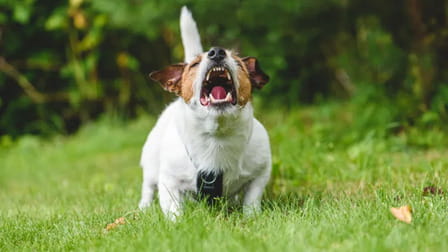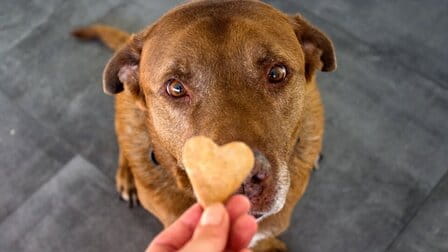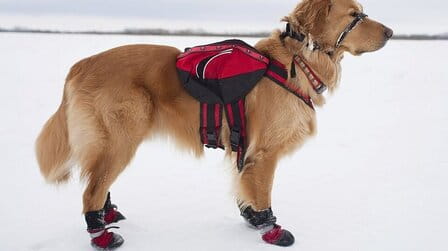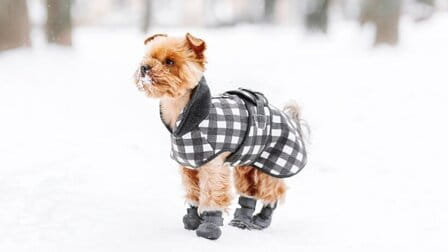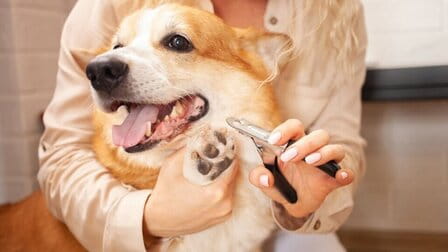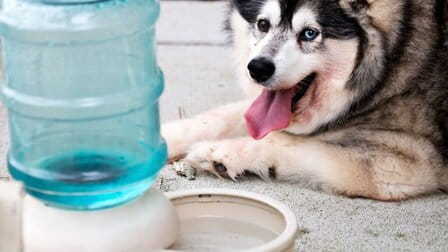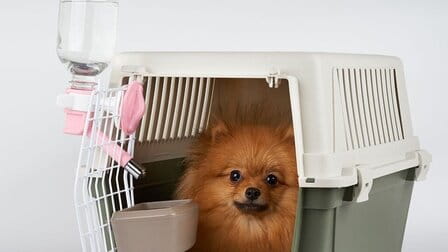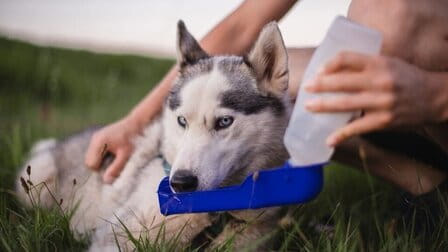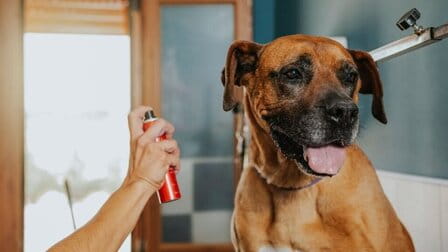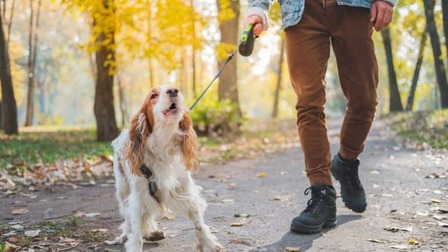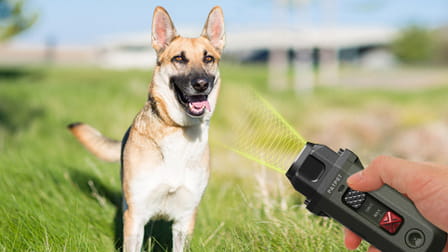You can observe with your pet, often dogs and panting go hand in hand. The act of a dog panting when his tongue sticks out of his mouth. Since dogs won't sweat like humans, panting is the dog's way of cooling down.
In most cases, panting is a normal part of running or playing, if they're excited, nervous, or somewhere warm. The gasping pattern is nothing to worry about.
But sometimes panting can be a sign that something is wrong if the dog has other symptoms. So how to calm a dog down when panting.
1. Don't worry about panting
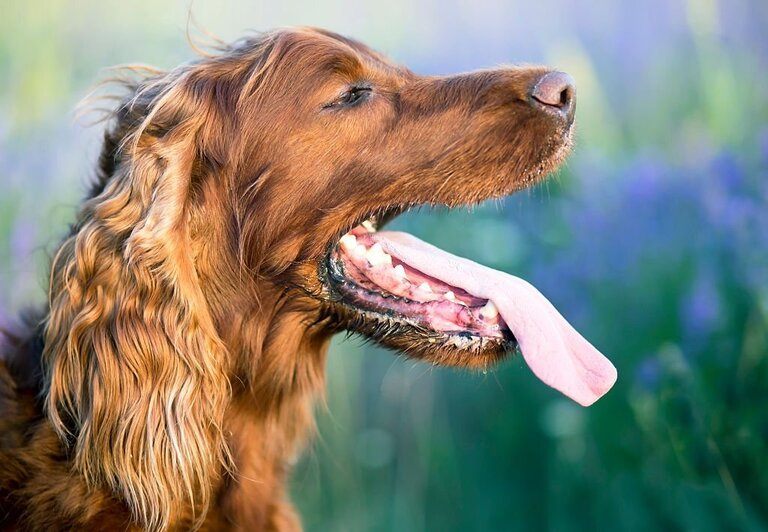
It's normal to gasp after exercise. Pictures of dogs panting for the same reason to cool off. If your dog is very active or it's warm outside and walking, panting shouldn't be a cause for concern.
The fact that dogs pant when they are excited. If your dog is wagging his tail or staring at something outside, he's probably fine.
2. Give the dog water to drink

The way to end healthy gasping is to drink cool water. When the dog pants, the water inside the lungs and nose will evaporate to help the dog cool down. When you give them water to drink, it will help them replenish this reserve and return to a normal state.
If the weather is hot, dogs don't stop running around or they get irritated by visitors, so keep a large bowl of cold water nearby so they can get a drink whenever they need it.
But if your dog stops panting after a bowl of water, you don't need to worry. Anyway, you should bring a water bottle and a cup if you are walking your pet dog or going to the park to play catch.
3. Move the dog to a well-ventilated environment

If it's warm outside and the water doesn't help, take the pet somewhere cool. If they're pitching at the park or walking on a hot day and they're starting to pant excessively, it's time to go home.
You should take them to a cool room and turn on the fan. If it's hot inside but cool outside, take it outside for a breath of fresh air. Taking them to a cooler space will bring them back to normal easily.
If giving your dog water and taking them somewhere cool doesn't alleviate the panting sound, they're probably nervous or over-excited. This is a sign of an underlying condition; If painting is persistent, you should contact your veterinarian.
4. Help the dog relax

Thunderstorms, fireworks, and strangers can all cause a dog to gasp. Take your dog somewhere calm and start petting them. In addition, reward the dog with a treat or two, turn on some soothing music and let the dog relax.
Furthermore, anxiety occurs if the dog does not get enough exercise and has a lot of accumulated energy. So take your dog for a walk or spend a few minutes playing with them.
If your puppy has a favorite spot in the house where he likes to relax, take it there.
If dogs have been cage-trained and they spend the night there, taking them to the crate and hanging out nearby can be a solution to limit panting. This might give your dog a sense of security. Some other signs of stress include: yawning, whining, hiding, tail drooping, flattened ears, and hunched over.
5. Immediately check for unhealthy panting

Where does unhealthy grasping come from and goes hand in hand with coma? Some expressions don't play, hide, or drool a lot. You should consider whether your breathing rate is appropriate for your temperature or activity level. If it's cold outside or your dog starts panting while they're sleeping, you need to look out for the problem.
In general, dogs may not need an emergency vet visit depending on the source of the panting. However, for the first time, going to the vet is a priority.
6. Watch for signs of dehydration

You can monitor by opening your dog's mouth to see if their gums are dry and sticky. Those are two states of dehydration. Also, pinch your dog's skin gently to see if it's dry, hard, or firmer than usual. Also, check the nose to see if it's completely dry.
If your dog doesn't regularly drink water and has any of these symptoms, give him water now.
Other signs of dehydration include loss of appetite, vomiting, lethargy, sunken or dry eyes, and thick saliva.
7. Check for heat stroke if the dog is hot outside

The fact that the eyes are dull, apathetic, and the heart is racing. Open your dog's mouth to see if its tongue is red or dark purple. Sometimes it's hot and if the dog has any of these symptoms, it may be suffering from heatstroke.
At this point, you should move the dog to a cooler area and put a cold towel on his head. Or pour cool water over your body and add some ice or cold water.
If it's too urgent, take your dog to the vet as soon as you've cooled him down.
Also, to prevent heatstroke, limit exercise on hot days, make sure to drink plenty of water, and leave your dog in the shade.
To be sure, the puppy's temperature can be measured with a rectal thermometer to confirm. A body temperature of normal dog is 101.5°F (38.6°C). If the temperature is above 105–106°F (41–41°C), the dog is at risk of heatstroke and should see a veterinarian immediately.
8. Find the wound if the dog is in pain

Panting combined with shaking, limping, or groaning is a sign of pain. Dogs may have glass in their paws or a cut somewhere on their body if they pant excessively.
Now check their paw pads for rips, shards of glass, or debris. Look through their coats for growths or cuts.
If your dog's paw is bleeding profusely and this is a small wound, cover it with a clean towel and apply it to stop the bleeding. If something is stuck in their paws or skin, take them to the vet to have it removed.
If the wound is bleeding profusely, is in a sensitive location, or is found, take them to the vet immediately.
9. Dog food

Panting can be a sign of poisoning or an allergic reaction. If your dog rummages through the trash or licks a tree at the park and starts panting for no reason, take him to the vet for immediate treatment.
Furthermore, Chocolate, raisins, certain plants, antifreeze, rat poison, and many other chemicals are all toxic to dogs.
If the dog also vomits, has diarrhea, acts restless, or urinates a lot, it's a sign that they ate or licked something that made them sick.
10. See your vet if panting doesn't stop

Although gasping for breath is a symptom of many different conditions. Sometimes you can't fix these problems on your own. The vet is the next step you need to take. A sign of rapid breathing can be:
- Heart problems
- Lung disease
- Anemia
- Cushing's disease
Conclusion
From the information above, you will find that some breeds tend to pant more often than others such as Brachycephalic breeds, such as bulldogs, puppies, mastiffs and Pekingese, which will naturally pant more frequently. due to the short nose.
Besides, gasping is also some of the side effects of steroid drugs. If your dog is panting more than usual and they are on steroids for some other condition, you can contact your veterinarian.

